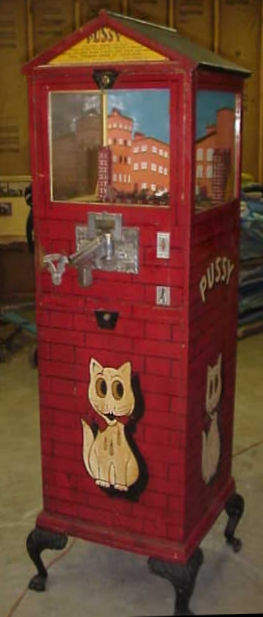- Home
- Replacement Artwork,logos,etc Available
- The Allwin Arcade
- Trade Stimulators
- The Strange & Unusual
- The Aristocrat Collection
- The Bally Collection
- The Bell-Fruit collection
- The BDR/BMR Collection
- The Bryans Collection
- The Buckley collection
- Caille Brothers Collection
- Working Models
- The Groetchen collection
- The Hawtin's Collection
- The Jamieson's Collection
- The Jennings collection
- The Mills Collection
- The NSM (Bingen) Collection
- The Oliver Whales Collection
- The Pace Collection
- The Parkers Collection
- The Rock-ola collection(slot machines)
- The Ruffler & Walker Collection
- The SEGA Collection
- the Shefras collection
- The TH.Bergmann Collection
- The Tom Boland collection
- The Watling collection
- The Whittaker Bros Collection
- the Wondermatics collection
- The Wulff Collection
- The Juke Box Age
- Coin Operated Cranes & Diggers
- Coin Operated Shooting Games
- Coin Operated Weight Scales
- slot machine coins & tokens for sale
- Amusement Arcades from the Past
- The British Seaside Pleasure Pier
- The Market Place
- Coin Operated Related Seaside Postcards
- See a Selection of the More Complex Machines at Work
- Stuart Dale's Imperator Rebuild
- Stuart Dale's Steam Shovel Project
- The "Allwin" Machine
- Useful Links
- The Rye Heritage Ctr Collection of Working Models
- Williamson's Vintage amusement arcades
- Contact Us

Coin Operated Shooting Games 
.
.From the very start of the coin operated amusement machine era shooting games were in demand,as they still are today. But for the time frame we are interested in on this site they fall into , basically , three types. 1. actual steel ball firing guns, 2. electro mechanical console units and 3. light sensing target games.
The first on the scene (around the late 1890's) were ,of course, the games that actually fired a projectile for these were,for the most part, purely mechanical .Makers on both sides of the Atlantic were quick to see the appeal of a shooting game but their designs were restricted by their very nature. Without exception they had to be very strong,reliable and totally enclosed. The projectile of choice was the ball bearing (although some machines used the players inserted coin as the bullet) to get a fair sized ball bearing to travel any distance at all and knock down a target that could withstand the constant battering a fair amount of force was needed add to this the fact that the player would need to see into the cabinet the problems are obvious. To overcome some of these problems the design of the early machines was restricted to a quite small target distance, using a gun that couldn't be transversed enough for the shot to hit the glass viewing area, firing a metal ball against a cast metal target (this last idea surprisingly reduced the amount of bounce and ricochet the ball might have after hitting the target area). The "gun" used needed to self load from a run of several balls(or the returning single ball),spring load the firing mechanism from the pulling of the trigger and fire the ball with some(if not great) accuracy. A rifle type gun was out of the question,the distance to the target was often less than the length of a rifle barrel! So a pistol it would be. This pistol would be perfected by the Tratsch/ABT company and most companies used a gun of this design for this type of shooter right through to the last new models in the mid 1960's. Because of their strong construction many of these early machines have survived,all be it in various states of repair.
Shooters were popular enough during the first two decades of the 20th cent but production was an additional product rather than a main line item but that all changed in 1925 when Tratsch /ABT brought out the "Target skill". This machine offed for the first time 5 balls for 1 cent powered by the perfected self loading Tratscht gun. It was an instant hit and production was soon running at 2,000 per month, variations of this machine including different themes and qualities would continue to be in demand for the next 40 years and when production finally ended in the 1960's over 300,000 had been made.
.
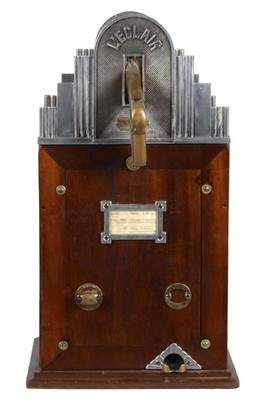
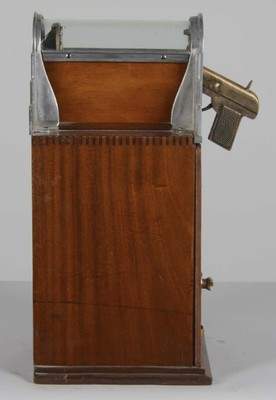
Early French shooting gallery made by Loubet
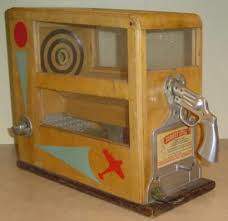
Fey "electro Fire"
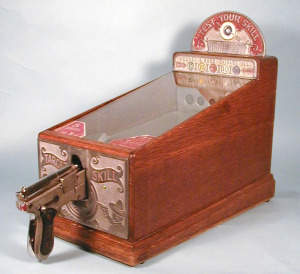
ABT "Target Skill" 1925
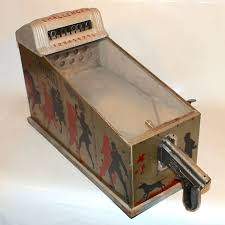
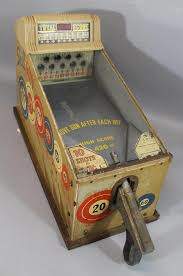
The very popular "Challanger" and "Skill Shot" both ABT from 1926 onwards
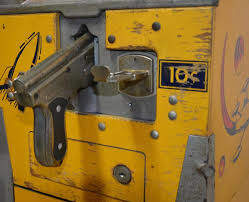
The Tratsch gun (this one from a 1950's Automatic games "New Frontier"
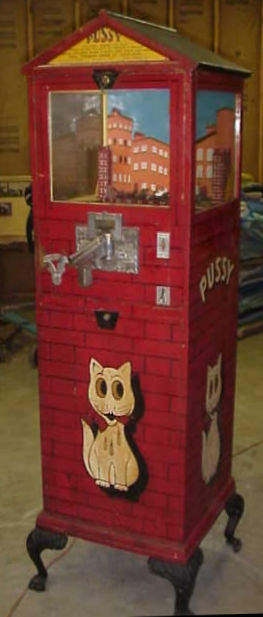
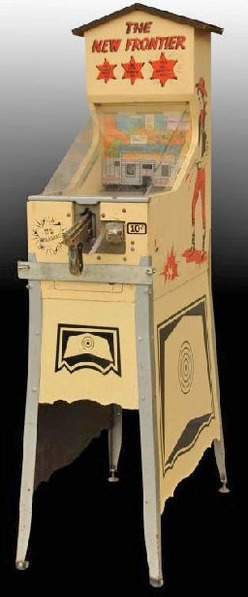
Much sort after today The American British novelty Co "The New Frontier" 1950's
"Pussy Shooter"1930's
Strangely unlike the popular live rifle ranges at fairgrounds that always offered a prize for good shooting the coin operated shooter very rarely did at any time during it long history. At best some machines gave the player his money back for a perfect score. This helped make shooters a good seller as they had few restrictions within the law.
Perhaps it would seem natural that the next type on the scene would be the electro mechanical shooting range, but only partly so .
In 1935 a man named Charles Griffith invented a system using light .this projected a quick flash of light that was ,if correctly aimed, was picked up by a sensor on the target registering a hit. Patented as "Ray-O-Lite this would produce the most interesting and life like shooting gallery games of all. This system allowed for the gun to be situated some distance from the target box allowing for a rifle type gun (much more fun ) .The machine did contain a large amount of mechanical parts at the target end so it was an electro mechanical game but the light sensing puts it in its own well earned category .
Its not clear if Griffiths approached Seeburg or the other way round but Seeburg were very quick to snap up the rights to produce Ray-o-lite games although it would be more than 10 years before Seeburg actually owned the rights to the idea. By 1936 Seeburg were selling the first ray-o-lite shooters featuring a single duck target,these were priced at a very substantial $475 which underlines not only the high production and development costs but also the high revenue potential.
. 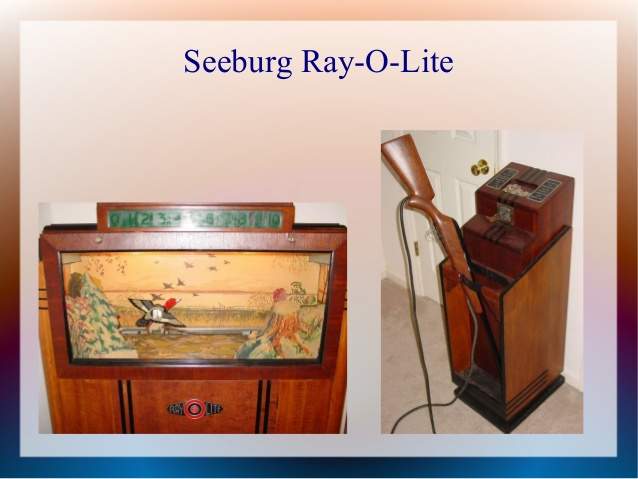

Early Seeburg Ray-o-lite 1935
One of the benefits of this game was that targets could be changed and up graded to keep the play fresh and interesting and soon Seeburg and other smaller companies were offering new conversions. Seeburg came out with "jailbird" where the player was invited to shoot an escaping convict (!) and Chicken Sam ,a chance to shoot a hobo stealing chickens(!).
Also available were "shoot the barman" and "shoot the mother in law" but with the outbreak of WW2 even more politically incorrect themes were offered.
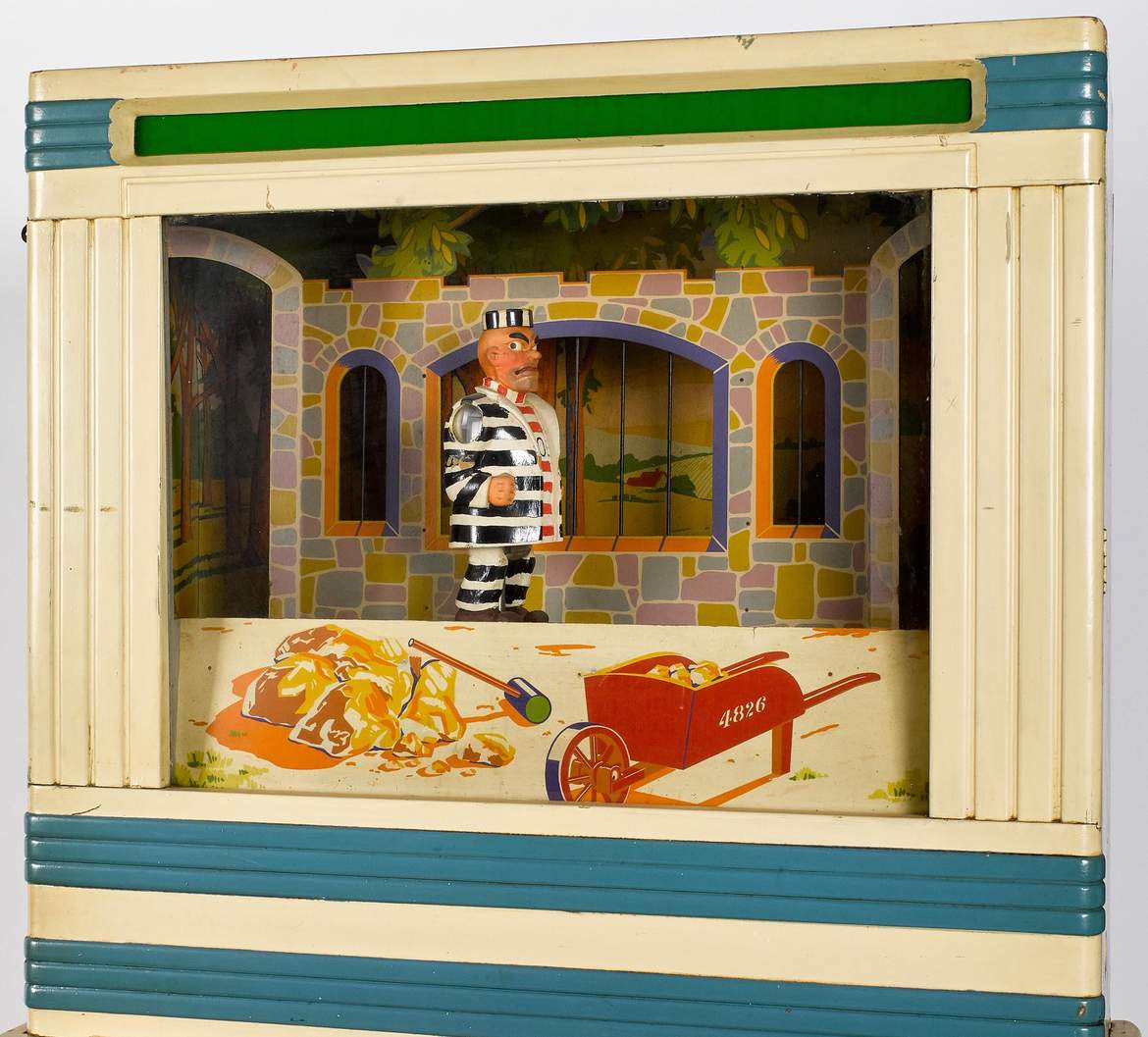
" Jailbird"
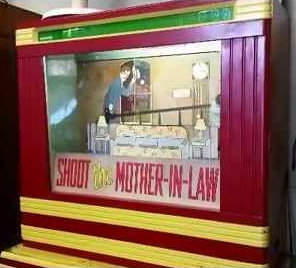
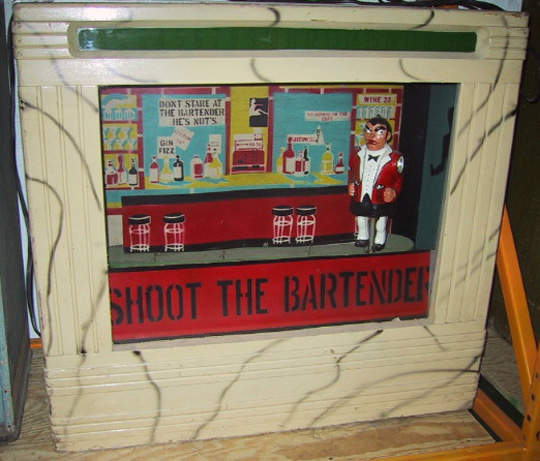
shoot the Mother in law Shoot the bartender
By 1940 many of the big slot makers were licencing the system and making there own Ray-o-lite machines .Chicago coin (always keen on shooting games) was one of the first to join in
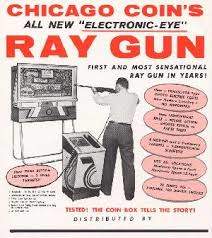
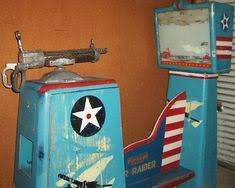
This Williams(?) " *** Raider" was a bit of a crossover between the light guns and the electro mechanical
Bally produced two war time themes "convoy" and "sky battle" based on their "rapid fire" machine The interesting "Convoy" featured a Nazi U boat as a target yet came out a full year before the USA entered the war !
This game can be seen in action below
. Meanwhile by 1942 Seeburg where doing their bit towards the war effort with "Kill That Jap" "trap a Jap" and "Chutes" featuring parachutes as targets
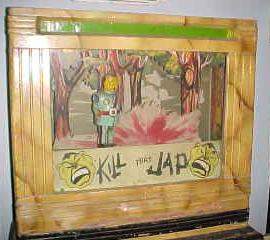
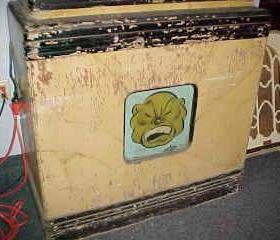
Seeburg "Kill that Jap" 1942
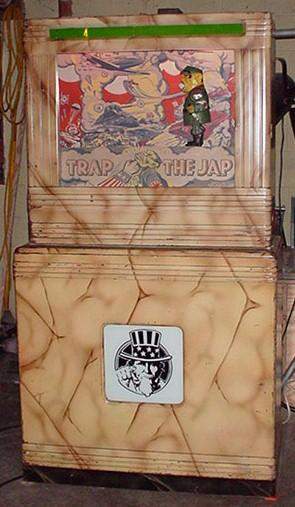
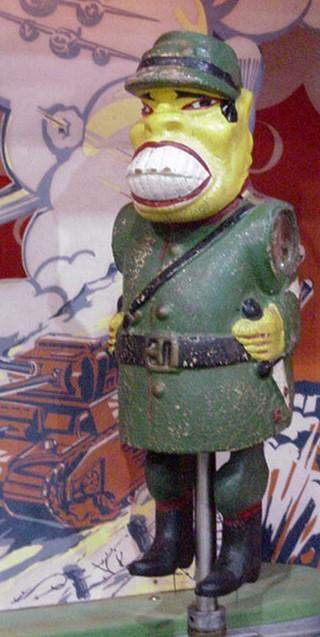
"Trap the Jap"
and last but not least the strangely named "Hit the Siamese Rats "a conversion offered by Harold Thompson ,Seeburgs Texas distributor .Took me a while to grasp the meaning,moving one way the target is Hitler the other its Tojo hey are in fact linked as Siamese twins,perhaps this was going a little too far even during a war!
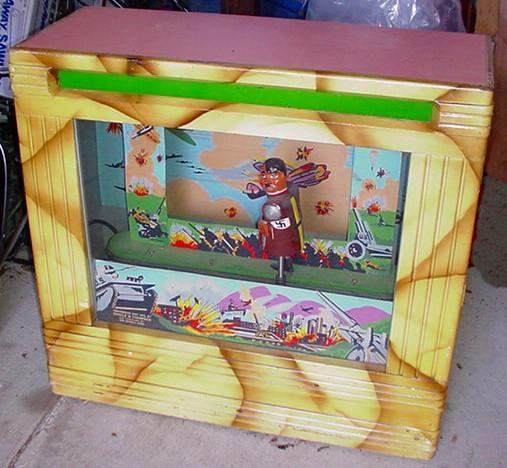
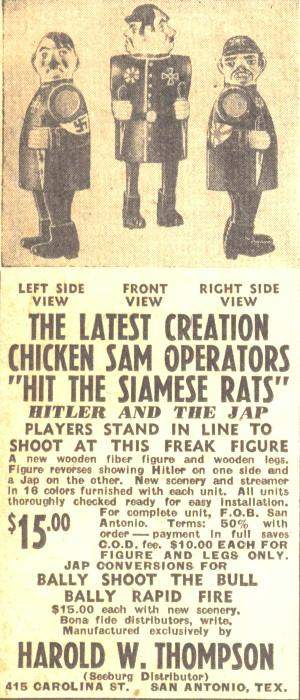
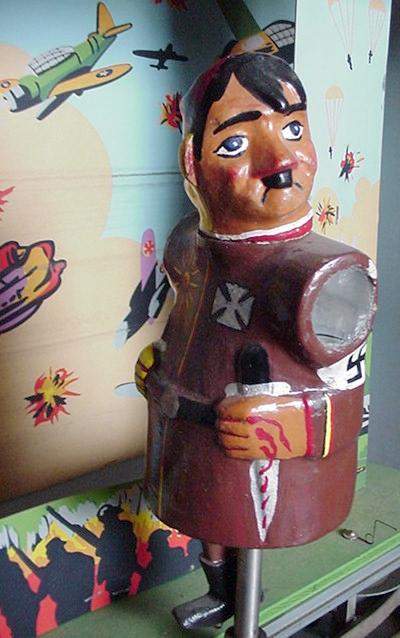
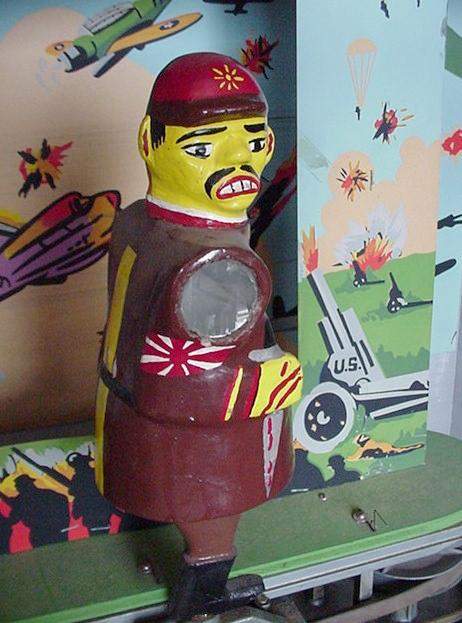
a chubby faced Hitler and a somewhat jaundiced Toto from "Kill the Siamese Rats" both with blood on their hands
By 1945 Seeburg seem to have bought out Ray-o-lite and although still making the successful range of shooters the development was scaled down and those engineers who had developed the system and who were now working at Seeburg were switched to Juke box development. However the most iconic and best remembered Ray-o-lite game didn't come out till 1947 ." Shoot the Bear" was the final and most successful incarnation of the range. several backgrounds were used from mountains to forests
. 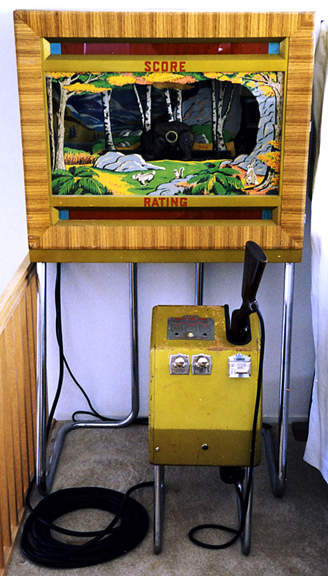
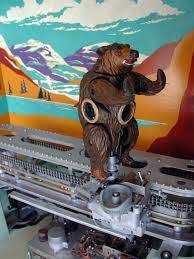
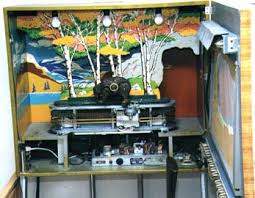
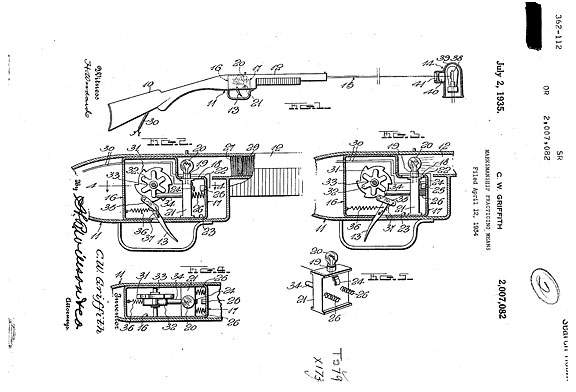
Ray-o-lite light gun patent
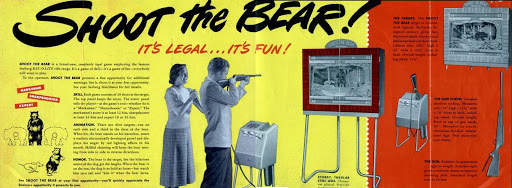
For someone of my age the shooting games I played as a kid came from the golden age of arcade shooters, the 1960's. The real electro mechanical shooters.These were not as complex as the Ray-o-lites but they were plentiful, varied and interesting to play. All the big manufactures of the time were into shooting galleries big time,all using much the same system and case design. The design was much more compact to suit the modern arcade and although the range was actually very short the design gave the impression that the player was shooting long distance. A lot of these machines used pin ball like electrics to handle the scores but a surprisingly mechanical linked system to cope with the aiming. Moving the rifle (directly attached to the case) moved a linkage inside the case to line up with the targets which laid flat in the case and the player only saw a reflected image in front of him. This type of game was very popular and every arcade had at least one, still expensive to play (in the UK at least ) at 6d per game and still no prize on offer but still they raked in the money. The technology would change over the next 30 years but the outward design would always remain much the same. "if it ant broke,dont fix it" was always an adage used in the coin op world and it was very true in shooting gallery design.
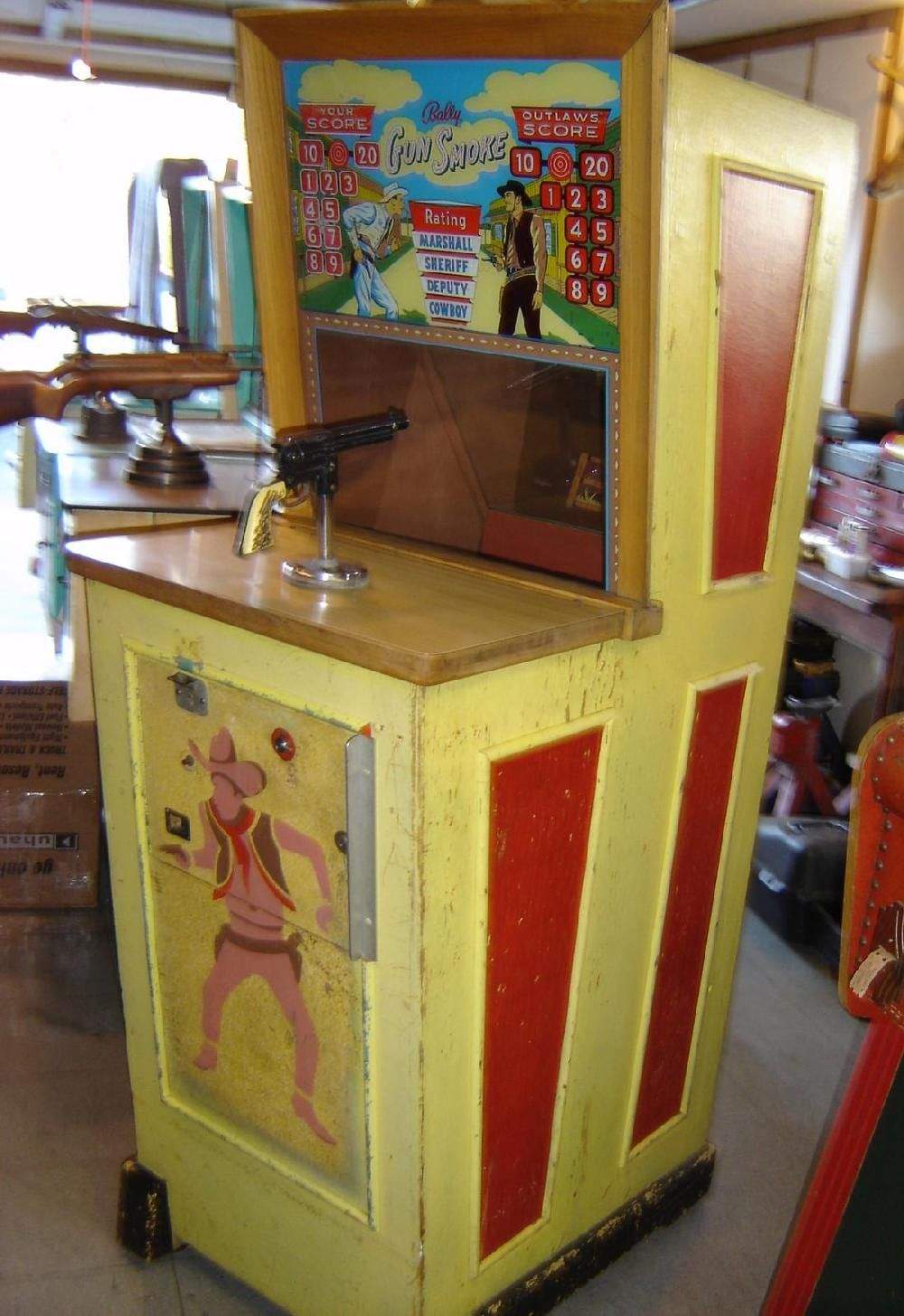

Gun Smoke (Bally) Wild West (Chicago coin)
The wild west and hunting themes were the early choice of themes and still hold there own today but companies were always looking for a new range of targets to draw in the punters,and some were a little odd to say the least.
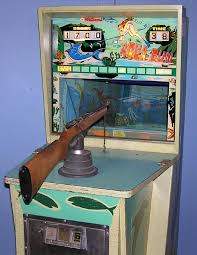
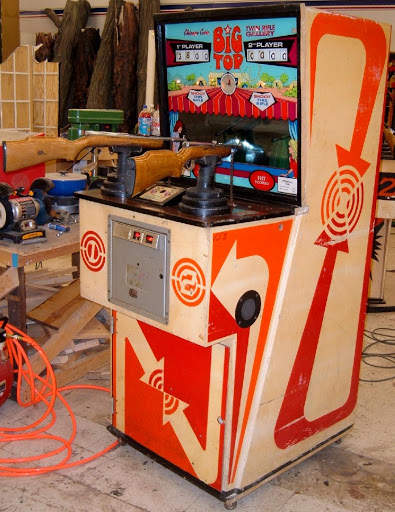
Williams offered the chance to use a normal rifle While Chicago coin's two player "Big Top" had in in for Circus
underwater with "Aqua gun " animals & clowns (Well clowns I can understand )
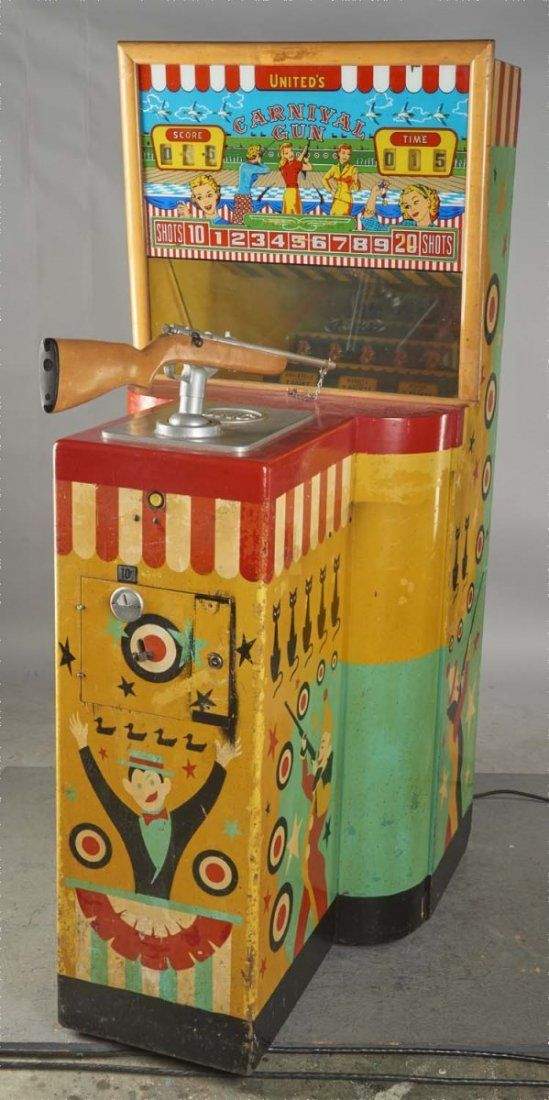
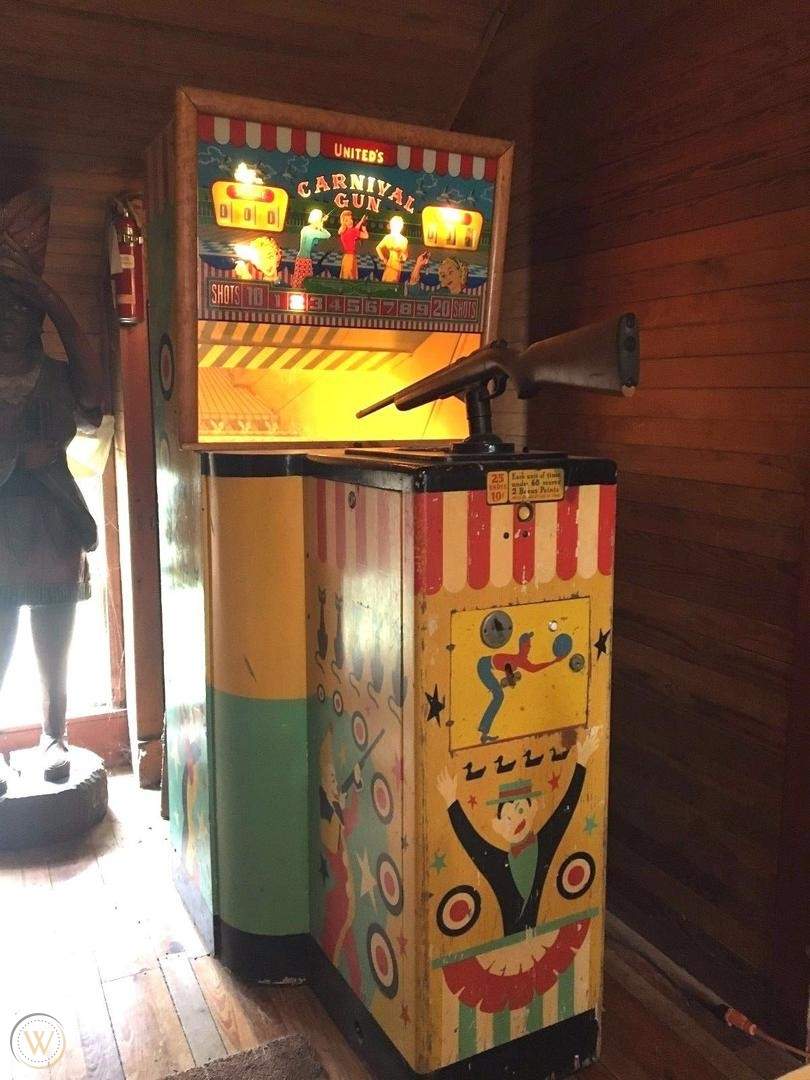
At least United's "Carnival Gun" was just a good straight attempt to offer a fairground shooting gallery simulation
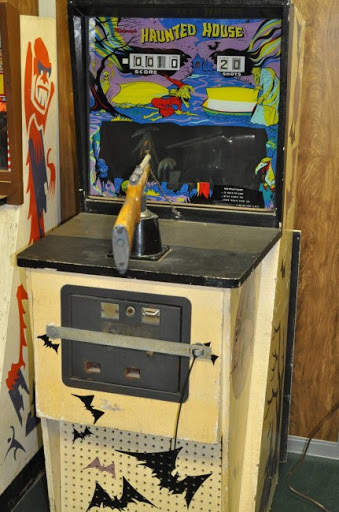
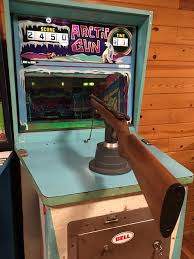
Midway "Haunted house" was always going to be a hit where as "Arctic gun" dragged the player off to the
frozen north and received a chilly reception
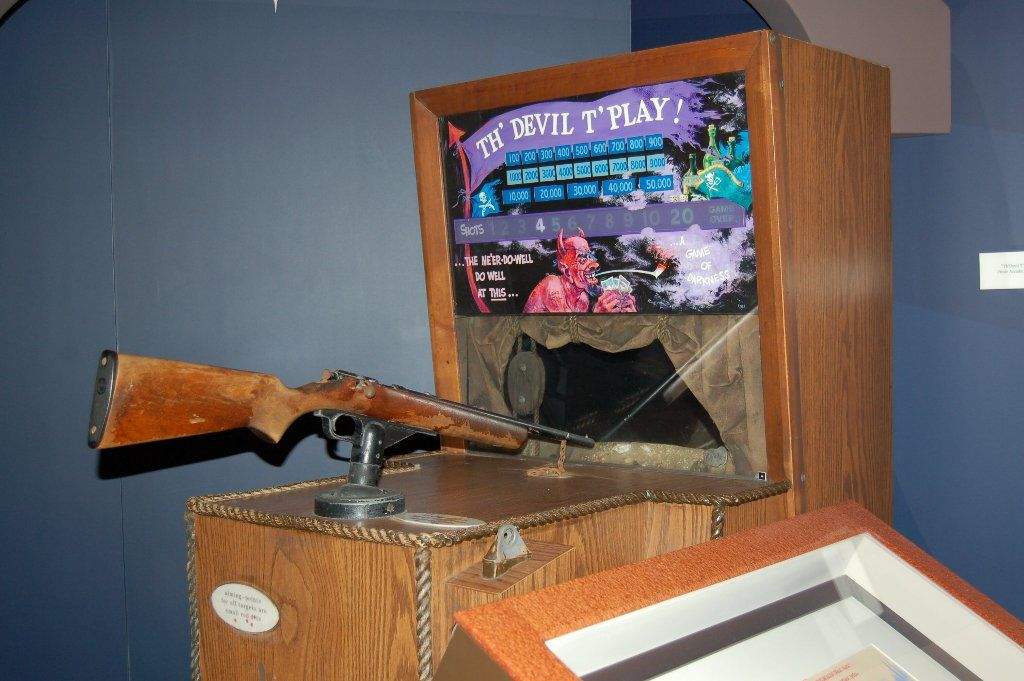
"The Devil T' Play" seems a bit of a desperate attempt to come up with something new
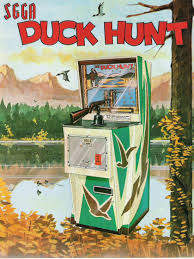
Sega's "Duck hunt" had a basic hunting theme but was a massive success
The Williams "Bouncing Ball" Shooters
In 1959 Williams came up with the variant of the standard shooter of the day that,for a short while at least, grabbed a large slice of the market. Utilising the fact that the targets were laid flat in the standard shooter at his time and the player only saw a reflected view Williams mounted a grid containing a number of rubber balls as the target, hitting one of the balls fired a plunger under the ball bouncing the ball up to re settle in another scoring socket,thus increasing the overall score. lining up the balls and other features gave bonus scores,other targets fired all the balls at once The view the player saw was unusual as the balls appeared to be bouncing horizontally towards the player! With shooter designs needing to be changed quite often to keep the players interested Williams had an added bonus with this type of machine in that existing target options could be changed easily without re designing the whole machine and for the next few years the company released several versions of what was in reality the same machine in a new suit of clothes. On the down side the machine relied heavily on electronics rather than mechanical connections so cost more to make in the first place .
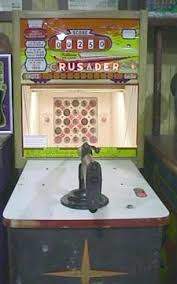
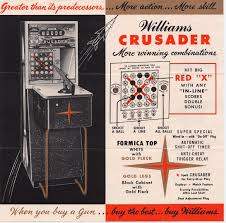
The " Crusader " which boasted a "Formica top" as a highlighted feature(?)
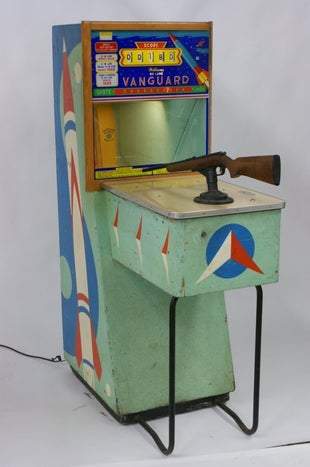
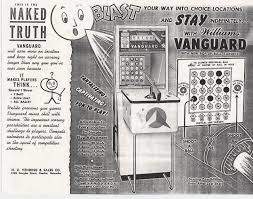
The "Vanguard" (1959)
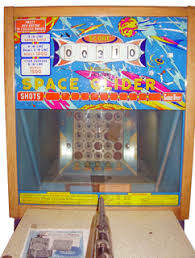
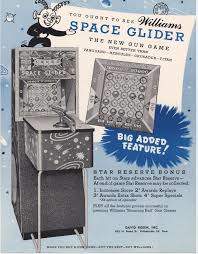
Perhaps the most popular bouncing ball shooter was the "Space Glider" (see it in action lower down)
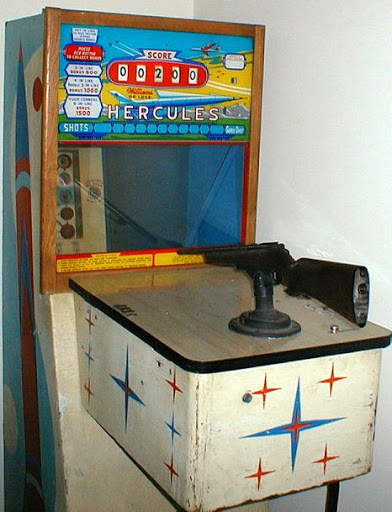
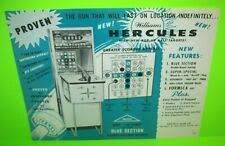
"Hercules" and "Titan" were much the same machine in reality
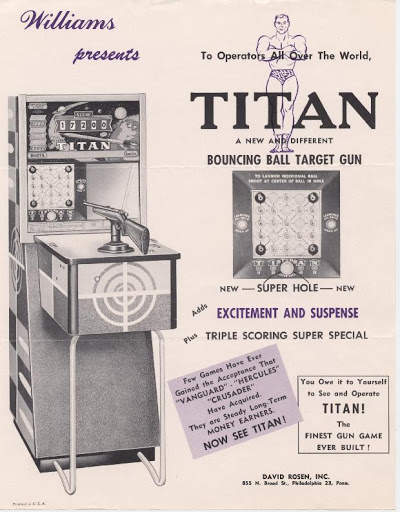
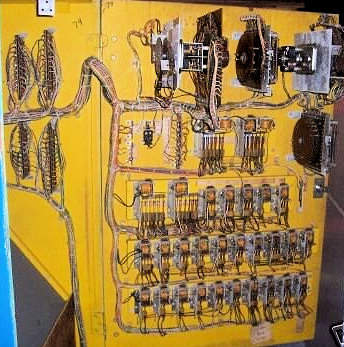
The "Titan" came at the end of the bouncing ball range Inside the Vanguard Delux
-------------------------------------------------------------------------------------------------------------------------------------------------------------------------
---------------------------------------------------------------------------------------------------------------------------
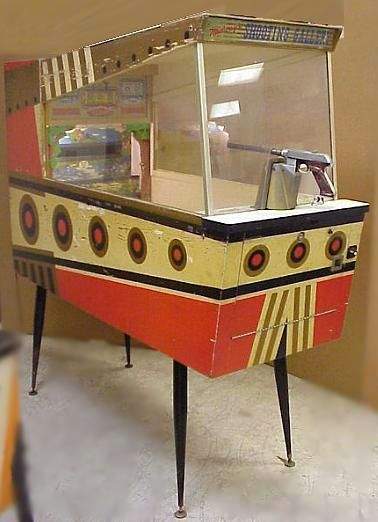
The Bally "shooting gallery" was an attempt to keep the mechanical shooter alive, issued in 1960 it couldn't
compete with the new style machines like Williams "Vanguard" released the same year
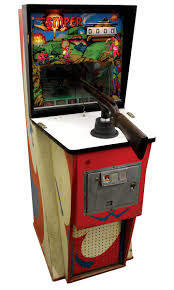
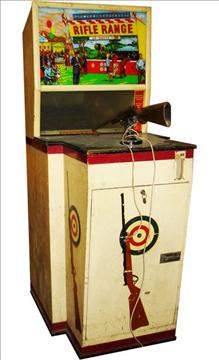
Williams "Sniper" was an interesting theme Streets Rifle range was made in the UK and very popular
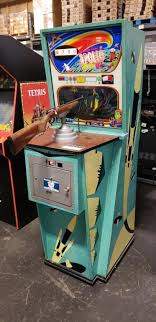
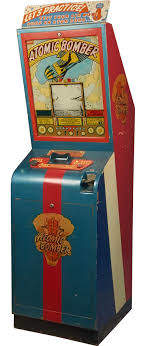
The "Apollo Moon Shot" seems to stretch the theme a little and the "Atomic Bomber"did away with the need aim at all
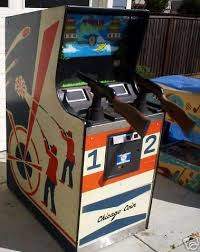
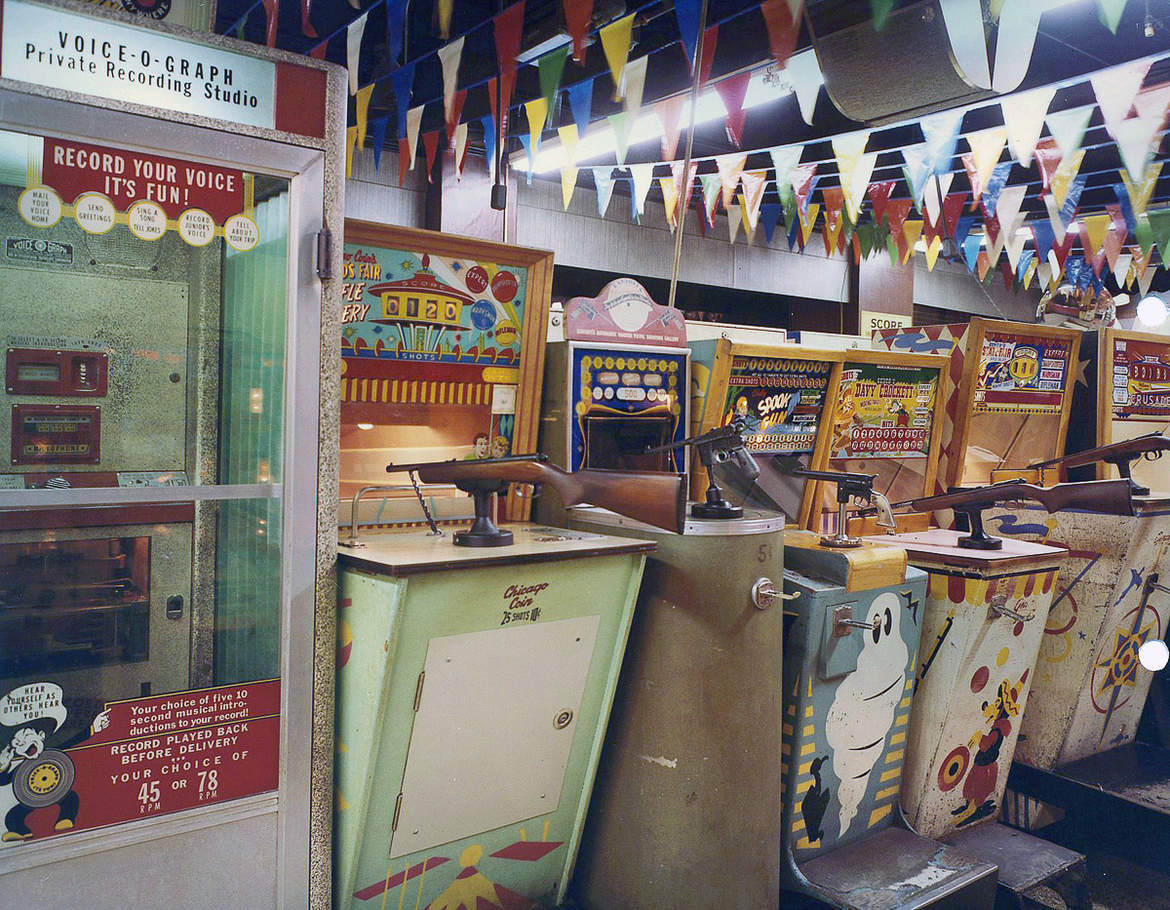
Chicago Coin's Twin skeet shoot (1974) an impressive "range" of shooters
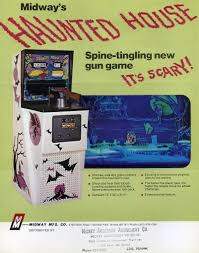
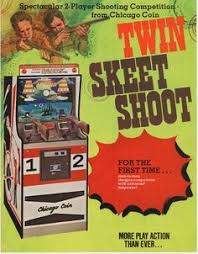
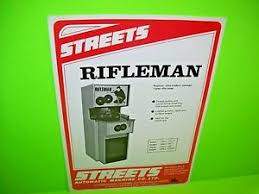
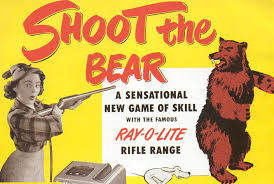
Williams "bouncing ball" Space glider in action
